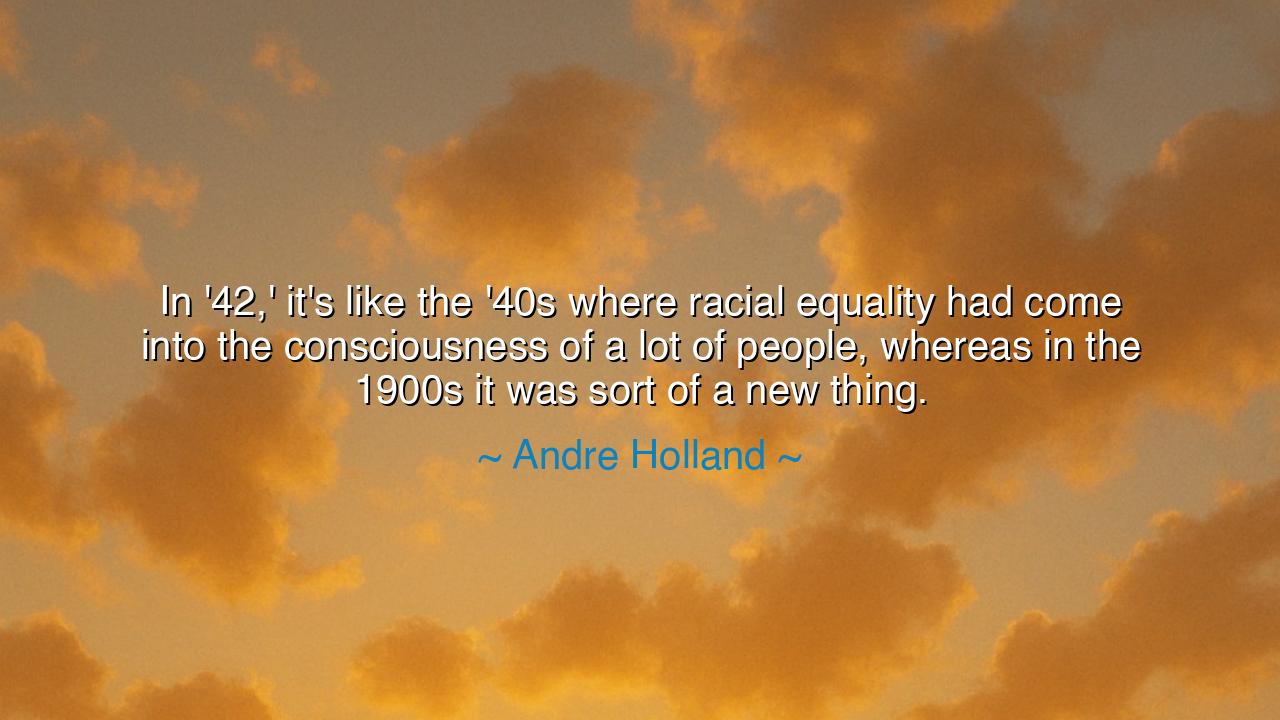
In '42,' it's like the '40s where racial equality had come into
In '42,' it's like the '40s where racial equality had come into the consciousness of a lot of people, whereas in the 1900s it was sort of a new thing.






Hear now the words of Andre Holland, spoken in reflection upon the film 42, which told the story of Jackie Robinson breaking the color barrier in Major League Baseball. He declared: “In ‘42,’ it’s like the ‘40s where racial equality had come into the consciousness of a lot of people, whereas in the 1900s it was sort of a new thing.” In this saying lies the recognition of history’s slow turning, how the idea of racial equality, first whispered in earlier centuries, began to thunder in the minds of the many by the 1940s. It is a reminder that justice does not arrive all at once, but grows like a seed watered by struggle, until it bursts into the conscience of a generation.
The meaning of Holland’s words rests in the contrast between two eras. In the early 1900s, the idea of racial equality was fragile, spoken mainly by visionaries, activists, and those who dared to dream against the tide. Their voices were often silenced by laws of segregation, by the violence of mobs, by the indifference of the powerful. But by the 1940s, the horrors of global war and the contradictions of a nation fighting for freedom abroad while denying it at home stirred something new. The cry for equality was no longer only the cry of a few—it became a truth that pressed upon the hearts of millions.
The origin of this shift lies in the march of history itself. The Great Migration carried Black families from the South into the industrial North, where their labor helped fuel factories and cities. The war against fascism revealed the hypocrisy of fighting tyranny abroad while permitting racial oppression within. In this crucible, the American conscience began to awaken. What had once been a “new thing” became a demand that could no longer be ignored. Holland, through his reflection, shows us how the consciousness of equality ripens over time, nourished by the courage of those who resist.
Consider the life of Jackie Robinson, whose story is told in 42. When he stepped onto the field as the first Black player in modern Major League Baseball in 1947, he carried not only a bat but also the weight of history. In the 1900s, such a thing would have been unthinkable, for the walls of segregation were too strong. But by the 1940s, the ground had shifted. The conscience of America was stirring, and Robinson’s courage became the spark that ignited the flame. His story proves Holland’s words true: the idea of racial equality had moved from the margins to the center of public life.
Yet this awakening was not complete. Even as Robinson played, he endured hatred, threats, and insults. Equality was in the consciousness of the people, but it was not yet in their laws or in their daily practices. This shows us that awareness is only the beginning. To know that justice is right is not the same as living it. The 1940s marked a turning of the mind, but the turning of society required decades more of marches, protests, and sacrifice.
The lesson here is profound: every generation inherits both the progress and the unfinished work of those before it. The 1900s planted the seeds of equality; the 1940s brought them to consciousness; later decades watered them with blood, sweat, and courage. And even now, the harvest is not complete. Justice is never given—it is wrested from the grip of indifference and fear, and carried forward by those who will not rest.
So, children of tomorrow, take this wisdom to heart: the awakening of conscience is the beginning of change, not its end. Do not despise the small beginnings of new ideas, for what is whispered today may be thunder tomorrow. And when justice enters the minds of the many, let it not remain only as thought, but press it into action. For only then will the dream of racial equality—a dream whispered in the 1900s, shouted in the 1940s, and fought for ever since—become a living reality for all generations to come.






AAdministratorAdministrator
Welcome, honored guests. Please leave a comment, we will respond soon